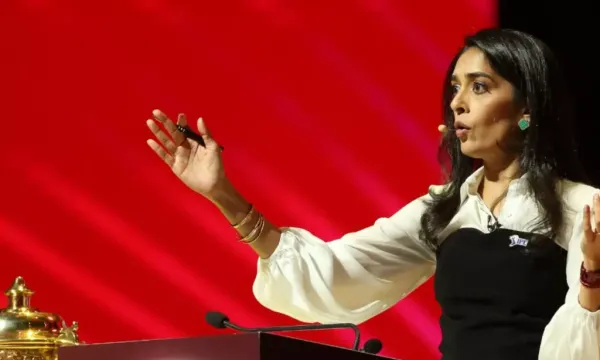
For more than two decades, Mallika Sagar has occupied an unusual intersection of worlds: elite art auctions and the adrenaline-filled chaos of sports bidding rooms.
Born on August 3, 1975, in Mumbai, she has become one of India’s most recognisable auctioneers and the first woman to lead high-profile bidding events across the IPL, WPL, and Pro Kabaddi League.
With her now-familiar calm voice, poised conduct, and razor-sharp control of the room, Sagar has reshaped what authority looks like in Indian sport’s most-watched auctions.
From her beginnings in global art markets to becoming the face of the WPL 2026 auction, her rise is a masterclass in versatility, discipline, and pioneering intent.
A childhood spark that became a career
Growing up in a family of art collectors and business professionals in Mumbai, Mallika was surrounded by creativity, culture, and aesthetics from a young age.
Her father’s involvement in the art world created an environment where auctions, galleries, and fine art discussions were part of everyday life.
A children’s book, featuring a female auctioneer, is something she often credits as the earliest seed that sparked her fascination with the gavel. This early curiosity matured into a formal pursuit: after schooling split between Mumbai and Connecticut, she moved to the United States to study Art History at Bryn Mawr College, Philadelphia.
The global academic exposure, coupled with her upbringing, laid the foundation for a career in a field traditionally dominated by seasoned European specialists.
Rise as a young Indian auctioneer
Mallika’s professional journey began in 2001 when she joined Christie’s in New York. At just 26, she made history as the auction house’s first Indian woman auctioneer, specialising in Modern Indian and South Asian art.
After several years abroad, Sagar returned to Mumbai and took up a leading role with Pundole’s Art Gallery, one of India’s most respected art institutions. There, she conducted major auctions and became a recognisable figure in the country’s modern art ecosystem, eventually branching out as an independent art consultant and auctioneer.
Her years in the art world polished the qualities that would later make her indispensable in sports auctions.
Transition to sports
2021 — Becoming the first female auctioneer in Pro Kabaddi League
Mallika’s entry into sports auctions happened almost serendipitously. Amid the COVID era, she was recommended as a potential backup for IPL auctions by veteran auctioneer Hugh Edmeades. Soon after, she was picked to conduct the Pro Kabaddi League Season 8 auction, becoming the first woman to lead the league’s bidding event.
It was an unexpected shift, but one that immediately showcased her ability to transfer art-market composure into a high-energy sports setting.
2023 — Women’s Premier League auction
Led the inaugural Women’s Premier League (WPL) Auction, a historic moment for women’s cricket.
Stepped in during the IPL 2023 mini-auction to complete proceedings when Hugh Edmeades collapsed due to a medical emergency. Her calm handling drew widespread praise and announced her arrival in cricket.
First Woman to lead a full IPL auction
She was appointed to helm the IPL 2024 mini-auction, becoming the first woman to do so in the league’s history. The IPL had moved the 2025 mega auction to Jeddah, Saudi Arabia, and Sagar retained the gavel, an endorsement of the trust the BCCI placed in her.
2025 — Commanding the WPL 2026 Auction
With the WPL’s growing profile, she returned as the auctioneer for the 2026 season player auction, firmly establishing herself as the most recognisable face in women’s cricket auctions.
Across these events, her consistency, clarity, and composed demeanor have become part of the televised spectacle.
Beyond sports, her contribution to modern Indian art remains significant. She is credited with elevating the visibility of Indian artists internationally and shaping contemporary art sale practices in the country.
Her crossover success has made her a role model for women in specialised professions, especially in spaces where authority is not often associated with women’s voices.